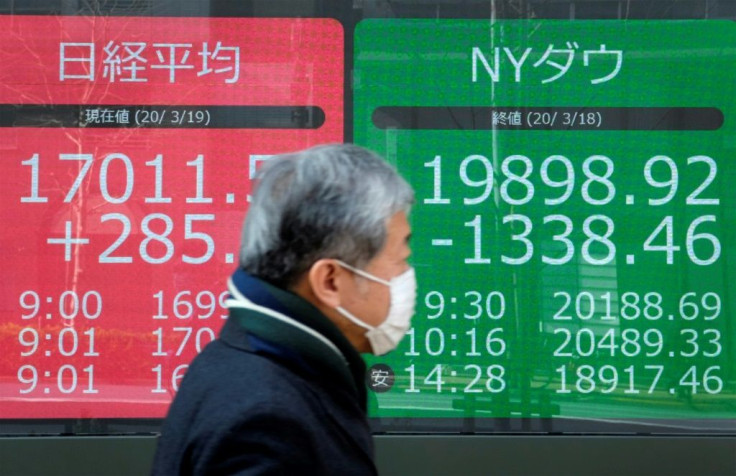ECB's Monetary Bazooka Peps Up Asian Stocks

Stocks in Asia bounced back Thursday after the European Central Bank launched an emergency plan to buy bonds in what one analyst said could be a "game changer" for the coronavirus-wracked eurozone.
Japan's Nikkei-225 led the gains, opening more than two percent higher as the news from Europe brightened sentiment despite another black day on Wall Street.
The broader TOPIX index in Japan climbed even faster, nearly three percent up in early exchanges after the surprise announcement by the ECB of a 750-billion-euro ($820 billion) scheme to purchase government and corporate bonds.
The so-called Pandemic Emergency Purchase Programme is temporary and will be halted when the coronavirus crisis is judged to be over "but in any case not before the end of the year", the ECB said.
"Extraordinary times require extraordinary action. There are no limits to our commitment to the euro," ECB chief Christine Lagarde tweeted.
Those comments echoed the words of her predecessor Mario Draghi, whose pledge to do "whatever it takes" to preserve the eurozone was seen as a turning point in the region's sovereign debt crisis.
The ECB's latest medicine could be "a game changer for the euro area economy and credit markets" if accompanied by fiscal action from eurozone governments, said Pictet Wealth Management strategist Frederik Ducrozet.
And only an hour or so after the ECB announcement, French President Emmanuel Macron stepped in to call for exactly that.
"It is up to us European states to be ready through budgetary interventions and greater financial solidarity within the eurozone," tweeted Macron.
Australian markets also notched up small gains as traders awaited similar emergency moves by the country's central bank later Thursday.
Before the ECB's intervention, traders had been bracing for another sharp decline in Asia after yet another coronavirus-inspired rout on Wall Street, with the Dow Jones index closing down more than six percent.
The Dow finished below the 20,000 point mark for the first time since 2017 as traders feared that the spiralling coronavirus pandemic could tip the world into a severe and long-lasting recession.
The ECB move also had a dramatic effect on the oil market, with the price of the US benchmark West Texas Intermediate up almost 17 percent at nearly $24 a barrel, recouping much of the 24 percent lost the day before.
Oil markets have been hammered due to collapsing demand as the virus prompts sweeping travel restrictions and business closures, and as major producers Saudi Arabia and Russia engage in a price war.
The news from Frankfurt also pushed down the yen on the foreign exchange markets, giving a boost to Japanese exporters and the wider stock market in the world's third-largest economy.
Despite news of automakers closing factories around the world, Nissan shares raced ahead by more than six percent, with rivals Toyota and Honda also climbing sharply.
However, not all analysts were impressed, with AxiCorp's Stephen Innes predicting further market sell-offs despite the historic moves by central banks and governments.
"Wartime economics is not going to help with everyone in lockdown sitting at home watching Netflix," said Innes.
© Copyright AFP 2024. All rights reserved.





















